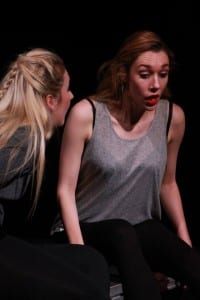Take Me By The Tongue might not be a naturalistic performance, however the acting
still needs to be believable. This requires a performer to be physically active, aware, brave and able to adapt to different roles quickly and believeably. Guskin explains that
“we want the audience to be lost in what we say and do, not standing back, judging whether we are acting the characters well or badly. So the lines must be our own, or the audience will see us acting a character.”
(Guskin, 2004, 42). Every line we say must have a incentive behind why the character is saying it, it needs to be said with intention. Miller agrees stating that “you must act, then the feeling will come. Intention must be there though.” (Miller, 2010, 90).The action is what matters, it’s what the characters or actors are doing, it’s the different context that should engage the audience. After all theatre is action, we don’t want to watch a group of people saying a bunch of words meaninglessly. By thinking about this for every scene, it made it easier to alter different styles of acting within the performance, for instance I could go from a moment that includes the audience, to a section where I need to be mechanical, and puppet like.
Inspired by this process of Stanislavski’s, Juliet Stevenson says “You take a piece of text and you dig downwards from the text and language towards the roots of the person… you come to understand the character, their experiences, so that the audience understands it, too.” (Stevenson, 2009, 6). This relies on finding the characters objectives, (something they want from the other character in the scene), the obstacles, (which prevent the characters from achieving their objectives), and actions (what you do, physically, to achieve the objective). This is how I have worked in order to make my acting styles believable to the audience. However not only do I think about the character, but what I, as Jade, wants the audience to think about, this is my personal super objective. Once having stepped into my role, and truly felt what is in my character, I step out of the role, and look back to what this scene should make people question. Davies explains a way of doing this for everyone to read other people’s parts, perhaps swapping roles every act. (Davies, 2007, 85). This gets you out of your head, and within the moment, it also allows you to see intentions and characteristics that you may have forgotten about.
During working on such a diverse piece, a challenge that, which I embraced, was to try to be accepting to trying all different possibilities and ways of changing my characters intentions, whether this was to do with an accent or physicality.This required me to be brave and to experiment, to think outside of the box. Davies agrees suggesting that “We must be prepared to experiment, be vulnerable, and if necessary make a fool of ourselves.” (Davies, 2007, 87). Abbott describes that the biggest mistake that an actor can make is trying to act out the subtext in order to make it clear for the audience. This is something in which we wanted to avoid, because we wanted the audience to come up with their own questions whilst watching our performance. We wanted them to leave perhaps confused, dazed, but at the very least questioning subject matters which we might suggest or touch on. Abbott explains in order to achieve this “Actors should understand it, feel it and then suppress it.” (Abbott, 2012, 126). My main goal as a performer was to maintain believability and emotional truth, if the audience can’t believe in what we’re saying then they will be too busy focusing on that, instead thinking about questions that the performance might pose. As Gusking explains,
“Acting is finding the truth. Some truths are more important that other truths… Good acting is when it is intellectually and absolutely inspired.”
(Kline, 2004, 36).
Works Cited
Davies, O, F. (2007). Performing Shakespeare. London: Nick Herns Books.
Guskin, H. (2004) How to Stop Acting. London: Methuen.
Miller, B. (2010) The Scene Study Book. New York: Limelight Editions.
Stevenson, J. (2009) Behind the Curtain…. The Guardian, 13 May, 6.


